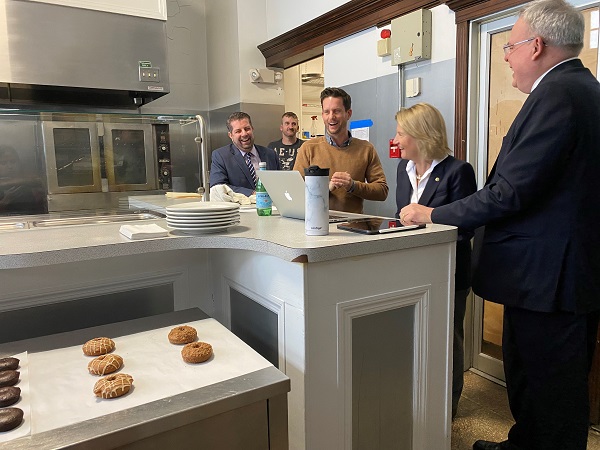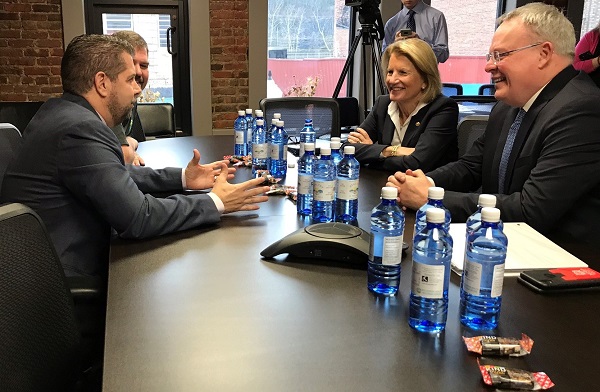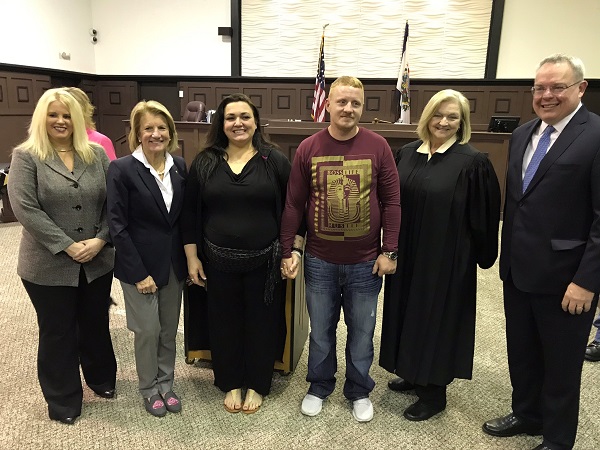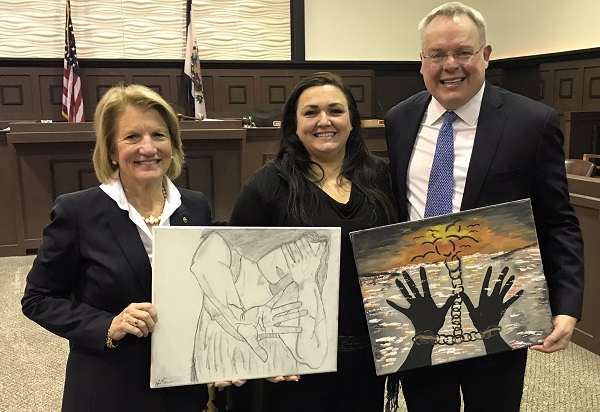WILLIAMSON, W.Va. – U.S. Senator Shelley Moore Capito (R-W.Va.) today hosted U.S. Drug Czar Jim Carroll, who serves as Director of the White House Office of National Drug Control Policy (ONDCP), in southern West Virginia for several visits focused around the state’s efforts to combat the opioid epidemic.
Senator Capito and Director Carroll began their day at the Williamson Health and Wellness Center where they met with Dr. Dino Beckett to learn more about his efforts in combatting the drug epidemic. Dr. Beckett has been instrumental in both improving health care and expanding economic development throughout the Williamson community. Following their meeting with Dr. Beckett, Senator Capito and Dr. Carroll attended a Drug Court graduation ceremony where they met with graduates, program mentors, and individuals in the early and middle stages of the Drug Court program. The final stop consisted of a visit to the Southwestern Regional Day Report Center, which offers a full range of services to assist adults struggling with substance abuse, including services to help motivate individuals to re-enter society and succeed.
“There’s no question that this opioid crisis has touched communities all across the country—especially right here in West Virginia,” Senator Capito said. “Despite the devastating consequences we’ve faced, the solutions our local communities have developed put West Virginia at the forefront of combatting this epidemic and, as a result, our state has served as a model for other cities across America grappling with substance abuse. The Office of National Drug Control Policy is critical to our efforts to combat this crisis in West Virginia and across the country. Today’s visits were an opportunity for Director Carroll to see exactly what West Virginians are facing, how our state is coping, and why we need the administration’s full commitment to fight this epidemic.”
“Senator Capito shares President Trump’s commitment to combat the addiction crisis impacting so many communities across West Virginia. It is because of strong and dedicated leaders like Senator Capito that we are starting to make a difference as West Virginia saw an 11 percent decline in drug overdose deaths in 2018. But there is still more work to do, and the Trump Administration will continue our whole-of-government approach that brings federal, state, and local partners together with those on the front lines of this fight to accomplish our ultimate goal of saving lives. I appreciate Senator Capito’s invitation to come to West Virginia and see firsthand how committed the Mountaineer State is to ending this crisis,” said U.S. Drug Czar Jim Carroll, Director of the White House Office of National Drug Control Policy.
“The Southwestern Regional Day Report Center welcomes the visit from Director Carroll and Senator Capito. This is a valuable opportunity to host federal decision-makers to both share with them our progress in battling the drug epidemic and discuss the obstacles and limitations that we are facing in our region. The counties of Boone, Lincoln, Logan, and Mingo have been plagued by the opioid epidemic and, in the past year, we have seen an emergence of methamphetamine use. I believe that we have to work together at all levels to save lives and I am pleased to host Director Carroll and Senator Capito to discuss the strategies outlined in the ONDCP’s Rural Community Action Guide,” said Michelle Akers, Southwest Regional Day Report Center Executive Director.
“As a Circuit Court Judge who presides over numerous cases, most of which involve substance abuse related crimes, nothing gives me greater joy than to witness first hand those that are able to overcome addiction and turn their lives around,” said Judge Miki Thompson, Circuit Court Judge for the 30th Judicial Circuit. “Our drug court has amazing success stories and I am extremely proud of the two graduates honored today. It is truly an honor and privilege to have guests from such high levels of government to take time out of their busy schedules to attend Mingo County’s drug court graduation and for them to be able to witness firsthand the positive changes that are taking place within our county. Mingo County has always been a shining star in West Virginia but the drug epidemic is ravaging our most precious resource, our people. It has affected nearly every family in our county. I am optimistic that with the help of Director Carroll and Senator Capito, along with Statewide Officials and support from the citizens of Mingo County, together, we will continue making positive changes and restoring lives and families not only throughout Mingo County but throughout the wonderful State of West Virginia as well”
ONDCP coordinates the development, implementation, and assessment of U.S. drug policy and Director Carroll advises the president on drug control issues. Senator Capito has led the fight to maintain critical resources for addressing the opioid epidemic through ONCDP because, among other things, it administers two programs — the High Intensity Drug Trafficking Areas (HIDTA) and Drug-Free Communities — that have been crucial in curbing drug addiction in West Virginia. Of West Virginia’s 55 counties, 23 participate in the HIDTA program.
Last month, ONDCP launched their Rural Community Action Guide to provide another tool to help community leaders in building an effective local response to the crisis of addition. The guide includes recommended action steps for various issues related to the issue of addiction in rural America. Click here for more details.
Photos from today’s visits are included below:

Senator Capito and Director Carroll visit the Williamson Food Company, which is a non-profit that employs individuals in recovery.

Senator Capito and Director Carroll meet with Dr. Dino Beckett at the Williamson Health and Wellness Center.

Senator Capito and Director Carroll attend a Drug Court graduation in Mingo County during today’s visits.

Senator Capito and Director Carroll pictured above with Mingo County Drug Court graduate Rebecca Spencer who used art therapy as part of her recovery.
# # #